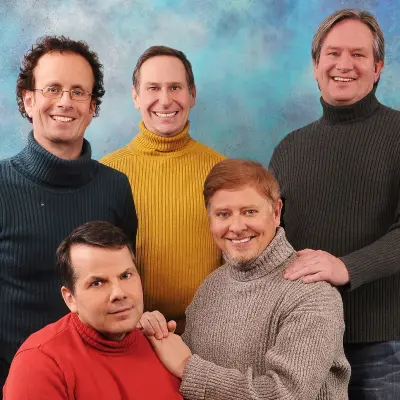Amazon's The Kids in the Hall revival manages to surprise amid the wash of familiar allusions
-

"The idea of a revived Kids in the Hall series, like so many other revivals of the past decade, comes packaged with intense trepidation," says Kathryn VanArendonk. "What if that nervy, surreal absurdism is blunted by nostalgic fondness? Is it possible to look back in celebration, without undercutting the past or, worse, being smugly self-congratulatory? Let’s also be honest: Who can truly feel confident that their male comedic heroes of the past are not at any moment about to reveal themselves to be anti-cancel-culture prophets, railing against political correctness and censorship?" VanArendonk adds: "After the treacherously high expectations of reviving a beloved comedy series plus a swooning documentary, the cumulative experience of the new Kids in the Hall feels nearly miraculous. It’s wonderful to have so many things to dread, and to instead be greeted with strange, goofy, self-referential, yet self-deprecating sketches. The Kids, now around 60 years old, are still obsessed with absurdity and the inevitability of endings. If anything, they’re even sillier and darker than before."
ALSO:
- The Kids in the Hall revival is an adventure in aging -- with the same old bite: "Not all reunions are made the same," says Robert Lloyd. "Often, it’s for a payday, and even when the impulse isn’t merely financial, performers, bands or comedy teams — they are the same in so many ways — might remain content to recycle the old hits rather than knuckle down to do new creative work. Sometimes it’s a matter of personal history and creative connection and knowing how it all works — or, like muscle memory, not having to know how it works — and because there is a special joy in getting the band together. Well-written, expertly performed, unashamedly odd and full of beans, this would seem to be the latter sort of enterprise. An adventure, if you will."
- A revival works for The Kids in the Hall because their comedy has so often attuned to life’s darker, sadder absurdities: "This comes through especially clear as multiple new Kids sketch premises ruminate on changing times and finality," says Jesse Hassenger. "In another revival of older characters, longtime coworkers Kath (McCulloch) and Cath (Thompson) preside over their company’s final fax-machine transmission. Thompson’s adored monologuist Buddy Love turns up to commune with the world’s last glory hole. There are also some surprisingly topical points, like a Zoom call taking hilariously explicit inspiration from disgraced pundit Jeffrey Toobin. More often, though, the Kids are happy to poke fun at their new demographic, as when McDonald plays an older lady who wants to photograph her trendy restaurant food for 'social media.'"
- The Kids prove they are still fearless: "Not all of the sketches work—there’s no show where they all work—but the batting average is still so much higher than most programs that the Kids inspired into existence," says Brian Tallerico. "They’re back to show the generations that followed them how it’s done."
- The Kids in the Hall wasn't just one of the best ’90s comedy groups, but one of the most enlightened -- especially about feminism: "As a millennial misfit, I was drawn to the Kids’ offbeat sense of humor, but what really hooked me was the troupe’s feminist sensibilities," says Tabitha Vidaurri. "It was these five Canadian men in drag who opened my adolescent eyes to concepts like sexism, toxic masculinity, and gender inequality. I have many feminist heroes who are women, but as a teenager surrounded by Girls Gone Wild and The Man Show’s girls on trampolines, I actually learned about objectifying women from Bruce McCulloch’s character, Tammy the teen pop star. When an older male record executive attempts to seduce her with a bouquet of flowers, Tammy sings, “I’m not gonna spread for no roses … Laura Secord never did. Gloria Steinem did once, and then she felt sad.” No one else on TV seemed to be talking about Gloria Steinem, much less making a joke about fetishizing young girls."
- The Kids in the Hall: Comedy Punks documentary provides enough showbiz insight and interpersonal drama to entertain newbies
- Dave Foley, whose been working on the revival since 2018, explains what has changed: "We complain more about young people than we used to. But other than that, it’s pretty much the same," he says. "Yeah, it’s very creepy, really, how little any of us have matured or progressed. Yeah, as artists or as human beings. So it felt very much like the old days of just getting together and throwing ideas at each other and, you know, occasionally fighting about what’s the best way to do things. And just being in tears laughing a lot of the time. Because, yeah, that’s one of the nice things about working with the Kids is we spent all those years together."
TOPICS: The Kids in the Hall, Prime Video, Dave Foley
More Kids in the Hall on Primetimer:- TV Today: Streaming Brings the Drama With The Essex Serpent and The Lincoln Lawyer
- The Kids in the Hall revival unveils its Amazon premiere date and trailer, plus a companion docuseries
- The Kids in the Hall begins filming its Amazon revival
- Amazon orders The Kids in the Hall revival with all five original stars
